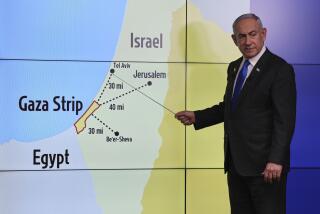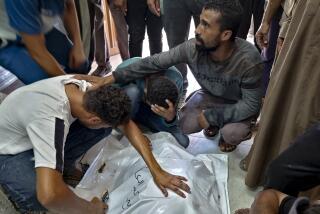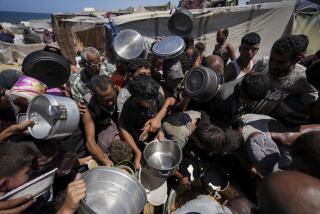Israeli troops and tanks move into the Gaza Strip

Israel has initiated a ground offensive in the Gaza Strip following a five-hour humanitarian cease-fire with Hamas.
After 10 days of Israeli airstrikes and rocket attacks by Palestinian militants, Israeli Prime Minister Benjamin Netanyahu ordered ground troops into the Gaza Strip on Thursday night, escalating an exchange of fire that has claimed more than 240 lives, all but one of them Palestinian.
Under cover of darkness, tanks rolled across the northern border of the coastal enclave, backed by intense shelling from the land, air and sea all along the frontier, witnesses said.
The immediate objective was to strike at tunnels Hamas and its allies use to smuggle weapons and fighters into Israel, according to a statement issued by Netanyahu’s office.
On Thursday morning, the Israeli military stopped what it described as 13 heavily armed fighters who had entered the country through one of the tunnels.
The government said it reserved the right to expand the operation, calling up an additional 18,000 reserve forces Thursday.
Israeli officials said Netanyahu made the decision to send in ground forces after Hamas, the militant movement that has controlled the enclave since 2007, rejected a cease-fire brokered by Egypt this week and fired rockets at Israel during a five-hour truce Thursday that was requested by the United Nations. The truce was meant to allow Gaza’s battered residents to stock up on food, cash and other necessities.
“In light of Hamas’ criminal and relentless aggression, as well as the dangerous attempt to infiltrate Israeli territory, Israel must act to defend its citizens,” Netanyahu’s office said.
Hamas spokesman Fawzi Barhoum called the decision foolish and “uncalculated” and said there would be serious consequences.
“There will be more than one Shalit,” he said, referring to former Israeli soldier Gilad Shalit, who was captured in a cross-border raid in 2006 and held by Hamas for five years.
The decision came despite continuing efforts by Egypt to broker a truce. Egypt’s president, Abdel Fattah Sisi, met Thursday with Palestinian Authority President Mahmoud Abbas and members of his Fatah faction. But Sisi does not have the same influence over Hamas as his ousted predecessor, the Islamist President Mohamed Morsi, who brokered a 2012 cease-fire.
The Egyptian foreign minister, Sameh Shoukri, blamed Hamas for the escalation of the crisis. “Had Hamas accepted the Egyptian proposal, it could have saved the lives of at least 40 Palestinians,” Shoukri was quoted as saying by the official Egyptian news agency MENA.
U.N. Secretary-General Ban Ki-moon expressed regret that Israel had ignored urgings by world leaders to avoid escalating the conflict, which has taken a heavy toll on civilians.
“In the past 24 hours, there have been a number of incidents involving the deaths of civilians, including the appalling killing of four boys on a beach in Gaza City,” Ban said in a statement.
“I urge Israel to do far more to stop civilian casualties. There can be no military solution to this conflict. This applies as much to Israel-Palestine as it does to Syria,” he said.
Seven more children were killed in Israeli strikes Thursday, according to Palestinian reports.
As the ground operation got underway, residents reported heavy shelling in Beit Hanoun, in northern Gaza. At least two people were killed and 12 were injured by a tank round as they tried to flee, local health officials said.
The U.N. has said the majority of those killed in Gaza were civilians. Israel says it takes steps to avoid civilian casualties, and it blames militants for hiding among them to launch strikes against Israel.
Throughout the day Thursday, leaflets were dropped across northern Gaza warning residents to evacuate to the south. Recorded messages were also sent to their phones.
Responding to earlier warnings, about 17,000 people have taken shelter in U.N.-operated schools in Gaza.
In a statement issued Thursday, officials with the U.N. Relief and Works Agency said that a stash of 20 rockets had been found in one of the agency’s vacant schools the previous day during a routine inspection.
The agency condemned what it called a “flagrant violation of the inviolability of its premises under international law” that endangered both civilians and staff.
The fighting resumed at 3 p.m. Thursday after a short and mostly observed humanitarian truce expired, with a fresh volley of rockets from militants and airstrikes by the Israelis amid a flurry of later discounted reports that a comprehensive cease-fire was imminent.
In Gaza, massive lines formed during the break at banks and ATMs, which opened for the first time in two weeks, and crowds swarmed markets to buy food. Authorities also scrambled to make repairs on water lines and other infrastructure devastated by Israeli bombing.
In some areas of northern Gaza, people were barred from returning home to areas Israel’s military had announced it planned to attack.
After the truce ended, sirens sounded in the southern Israeli town of Ashkelon and the Golan Heights, sending weary residents dashing for bomb shelters.
Separately, Israel’s Defense Ministry said that it regarded the killing of Mohammed Abu Khdeir, a Palestinian teenager slain in Jerusalem this month, as a terrorist attack, making him a recognized terrorism victim.
The Defense Ministry recognition entitles his family to certain benefits but also delivers a public and political message.
Mohammed, 16, was kidnapped from his Jerusalem neighborhood of Shuafat, beaten and then burned to death in what prosecutors called a crime of racism driven by hatred for Arabs.
The suspects reportedly told investigators that they killed him to avenge the kidnapping and killing of three Israeli teenagers in the West Bank in mid-June.
The teenager was chosen at random.
The three suspects in the killing were indicted in a Jerusalem court Thursday. The names of the suspects, a 29-year-old and two minors, were not made public.
Special correspondent Sobelman reported from Jerusalem and Times staff writer Zavis from Ashkelon. Special correspondents Rushdi abu Alouf in Gaza City and Amro Hassan in Cairo contributed to this report.
For news from Israel and the Palestinian territories, follow @alexzavis
More to Read
Sign up for Essential California
The most important California stories and recommendations in your inbox every morning.
You may occasionally receive promotional content from the Los Angeles Times.










